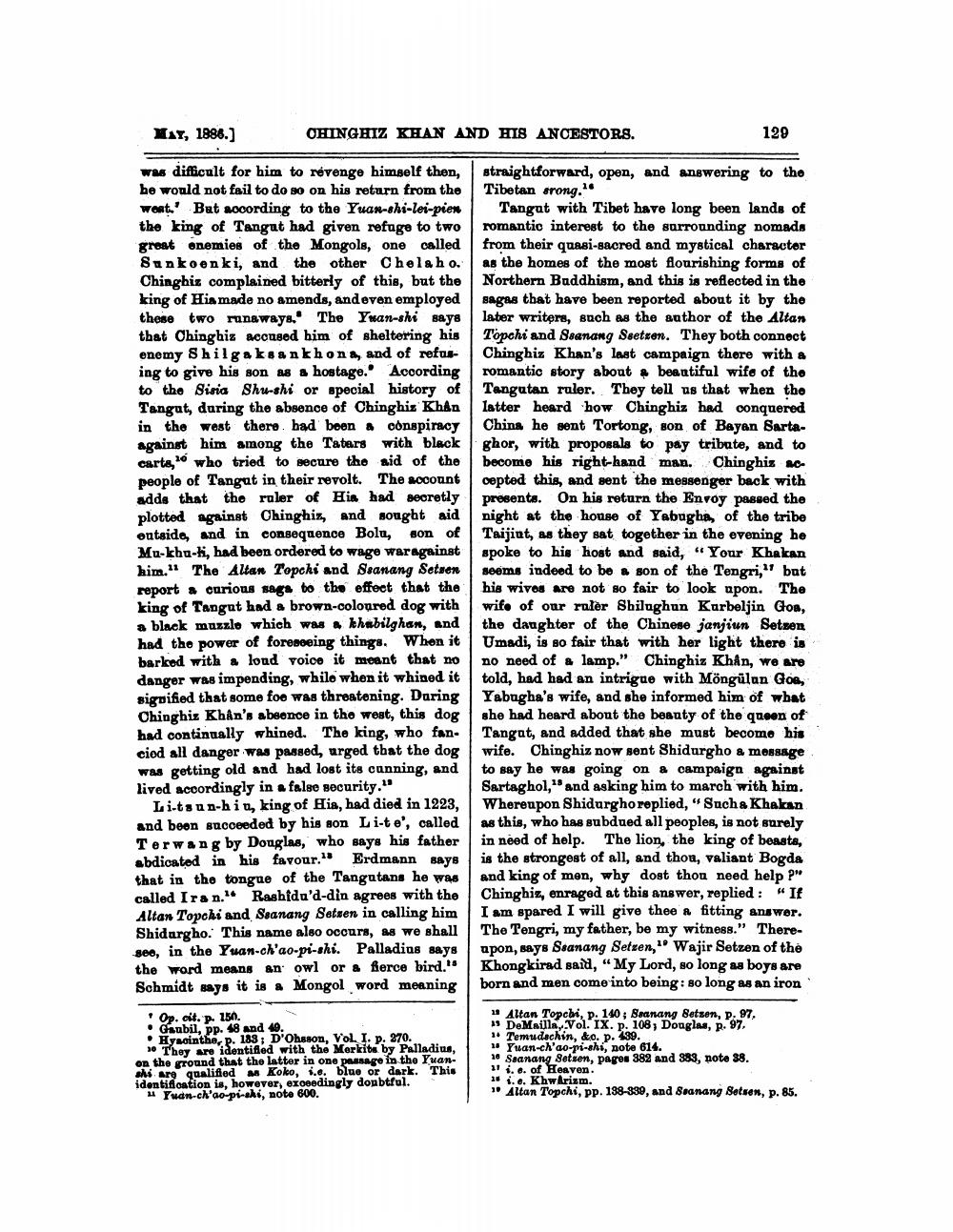________________
AY, 1886.)
OHINGHIZ KHAN AND HIS ANCESTORS.
129
was difficult for him to revenge himself then, he would not fail to do so on his return from the wont.' Bat according to the Yuan-thi-lei-pien the king of Tangat had given refage to two great onemies of the Mongols, one called Sunkoenki, and the other Chelaho. Chinghiz complained bitterly of this, but the king of His made no amends, and even employed these two runaways. The Yuan-shi says that Chinghiz aconsed him of sheltering his onomy Shilga kaankhon, and of refus ing to give his son as a hostage. According to the Siria Shu-shi or special history of Tangut, during the absence of Chinghiz Khan in the west there. had been a conspiracy against him among the Tatars with black carts, who tried to secure the aid of the people of Tangat in their revolt. The account adds that the ruler of Hin had secretly plotted against Chinghiz, and sought aid outside, and in consequence Bolu, son of Mu-khu-ti, had been ordered to wage waragainst him." The Altan Topoki and Ssanang Setsen report carious sacs bo the effect that the king of Tangat had a brown-coloured dog with a black muzzlo which was Whabilghan, and had the power of foresoeing things. When it barked with a loud voice it meant that no danger was impending, whilo when it whined it signified that some foo was threatening. During Ohinghiz Khan's absence in the west, this dog had continually whined. The king, who fan. ciod all danger was passed, urged that the dog was getting old and had lost its cunning, and lived accordingly in a false security."
Li-tsun-hin, king of Hia, had died in 1223, and beon succeeded by his aon Li-te', called Terwang by Douglas, who says his father abdicatod in his favour." Erdmann bays that in the tongue of the Tangutans he was called Iran." Rashfdu'd-din agrees with the Altan Topchi and Ssanang Setuen in calling him Shidargho. This name also occurs, as we shall 380, in the Yuan-ch'ao-pi-shi. Palladius says the word means an owl or a fierce bird." Schmidt says it is a Mongol word meaning
straightforward, open, and answering to the Tibetan srong."
Tangut with Tibet have long been lands of romantic interest to the surrounding nomads from their quasi-sacred and mystical character as the homes of the most flourishing forms of Northern Buddhism, and this is reflected in the sagas that have been reported about it by the later writers, such as the author of the Altan Topchi and Ssanang Ssetron. They both connect Chinghiz Khan's last campaign there with a romantic story about #beautiful wife of the Tangutan ruler. They tell us that when the latter heard how Chinghiz had conquered China he sent Tortong, son of Bayan Sartaghor, with proposals to pay tribute, and to become his right-hand man. Chinghis accepted this, and sent the messenger back with presenta. On his return the Envoy passed the night at the house of Yabugha, of the tribe Taijint, as they sat together in the evening he spoke to his host and said, “Your Khakan seems indeed to be a son of the Tengri," but his wives are not so fair to look upon. The wife of our roler Shilaghan Kurbeljin Goa, the daughter of the Chinese janjiun Setzen Umadi, is so fair that with her light there is no need of & lamp." Chinghiz Khån, we are told, had had an intrigue with Möngülan Goe, Yabugha's wife, and she informed him of what she had heard abont the beauty of the queen of Tangat, and added that she must become his wife. Chinghiz now sent Shidurgho a mensage to say he was going on a campaign against Sartaghol," and asking him to march with him. Whereupon Shidurgho replied, "Sucha Khalan as this, who has subdued all peoples, is not surely in need of help. The lion, the king of beasta, is the strongest of all, and thoa, valiant Bogda and king of men, why dost thou need help P" Chinghiz, enraged at this answer, replied: "If I am spared I will give thee a fitting answer. The Tengri, my father, be my witness." Thereapon, says Ssanang Setzen," Wajir Setzen of the Khongkirad said, "My Lord, so long as boys are born and men come into being: so long as an iron
Op. cit. p. 150. Gaubil, pp. 48 and 49. . Hyacinthe, P. 183; D'Ohsson, Vol. I. p. 370.
* They are identified with the Merkits by Palladius, on the ground that the latter in one passage in the Yuanshi arg qualified as Koko, i.e. blue or dark. This identification is, however, exceedingly doubtful.
u Yuan-ch'ao-pi-shi, note 600.
u Altan Topchi, p. 140; Ssanang Setson, P. 97, 13 DeMailla, Vol. IX. p. 108, Douglas, p. 97. 1. Temudechin, &o. p. 439. » Yuan-ch'ao-pi-shi, note 614. 1. Seanang Setzen, pages 382 and 883, note 88. 11 i. e. of Heaven. 21 i. e. KhwArizm.
Altan Topchi, pp. 188-939, and Ssanang Setsen, p. 85.




